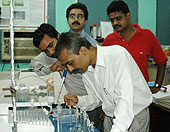 |
| Searching for a Telltale sign: Dr Sen and his co-researchers in the JU lab |
Sipping a few cups of black tea everyday can keep debilitating arthritis at bay. A research team led by Dr Tuhinadri Sen from the department of pharmaceutical technology, Jadavpur University (JU), has discovered that hot water extract of black tea can alleviate the chronic inflammation of auto-immune disorders like rheumatoid arthritis, osteoarthritis and gout.
“Studies with rats showed that black tea reduces swelling and peripheral pain, two cardinal signs of inflammation,” says Sen. “Black tea also protects the body from harmful free radicals, which, if produced in excess during inflammation, can lead to severe tissue injury.” Sen was supported in his research by Prof. A.K. Nag Chaudhuri and research students Sanmoy Karmakar and Dilip Roy.
In auto-immune diseases, the body’s defence system goes haywire. The cells that impart immunity treat the bone joints as foreign elements, triggering a cascade of chemical reactions that eat away cartilage. This leads to bone erosion and patients have agonising pain with swollen joints and stiff muscles.
To study the effects of the hot water extract of black tea on arthritic diseases, the JU team injected formaldehyde, an organic compound, into rats. This caused arthritic changes in the animals’ bone joints.
The animals were then divided into three groups. One group was fed hot water extract of black tea and another group received nimesulide, a NSAID (non-steroidal anti-inflammatory drug) drug that relieves pain and inflammation. The third group, treated as control, received normal saline solution.
To probe the effects of black tea on gout, the team also induced gout in rats by injecting sodium-urate crystal into them. In gout these crystals deposit in the joints and tendons, fuelling inflammatory reactions that swell bone joints. Again, different groups of rats received black tea extract, a painkiller and a saline solution.
When the rats were dissected, the team found that black tea had a beneficial effect on them. “When the paw diameter of arthritic rats was measured, we found that black tea significantly reduced the swelling of joints,” says Sen. “The rats, victims of gout due to sodium urate crystal injection, also showed significant reduction of paw diameter after being orally fed with black tea.”
Swelling, redness and pain are only the visible signs of any inflammatory response. Deep beneath the skin, at the site of inflammation, a host of cells move in secreting myriad chemicals that contribute to the signs. These chemicals include histamine, serotonin and prostaglandins, which bring about life-threatening cellular changes.
To find out whether black tea extract could arrest the activity of these chemicals, which generate oedema (abnormal body fluid between cells) during inflammation, the team injected rats with these chemicals. “We found that the tea extract could effectively reduce histamine and prosta-glandin-induced oedema in rats,” says Sen.
Inflammatory processes are often accompanied by sustained dilatation of the capillaries, delicate blood vessels, leading to an excessive secretion of proteins. It has been observed that common non-steroidal anti-inflammatory drugs counteract such permeability change, inhibiting oedema formation. “The study reveals that the tea extract disrupted the secretion of proteins like aspirin,” Sen claims.
During inflammation cells also produce arachidonic acid, which churns out enzymes like cyclooxygenase (COX) and lipooxygenase (LO), which play key roles in inflammation. The study found that the extract also inhibited arachidonic acid-induced oedema. There are two COX enzymes, COX-1 and COX-2. Among these, COX-2 plays a vital role in the inflammation of auto-immune disorders.
COX and LO enzymes are associated with the generation of lipid molecules, which initiates activities that ultimately leads to inflammation. Studies with different anti-inflammatory agents indicate that overexpression of such enzymes increases levels of lipid mediators, which, in turn, generate damaging free radicals during inflammation. “The tea extract probably interferes with the expression of COX and LO, reactions catalysed by these enzymes, functioning of the mediators and generation of free radicals,” Sen and his colleagues write in a recent issue of the journal Pharmacological Research.
Inflammation leaves behind an aggregation of abnormal cells, normally referred to granulation tissue. To study tea extract’s effects on the formation of such tissues, the JU team induced the formation of such tissues in rats by injecting cotton pellets. “We found that the tea extract decreased the formation of such tissue, suggesting its activity in the advanced phase of inflammation,” Sen adds.
It is known that free radicals play a role in any inflammatory disorder. Studies have shown that glucose-oxidase, an enzyme, produces hydroxyl radicals (a combination of hydrogen and oxygen with an unpaired electron), a dangerous free radical derived from the breakdown of hydrogen peroxide, as well as oedema, a telltale sign of inflammation. According to Sen, the tea extract not only inhibited glucose-oxidase induced oedema, but also mopped up free radicals, in rats.











